Search
To search for an exact match, type the word or phrase you want in quotation marks.
A*DESK has been offering since 2002 contents about criticism and contemporary art. A*DESK has become consolidated thanks to all those who have believed in the project, all those who have followed us, debating, participating and collaborating. Many people have collaborated with A*DESK, and continue to do so. Their efforts, knowledge and belief in the project are what make it grow internationally. At A*DESK we have also generated work for over one hundred professionals in culture, from small collaborations with reviews and classes, to more prolonged and intense collaborations.
At A*DESK we believe in the need for free and universal access to culture and knowledge. We want to carry on being independent, remaining open to more ideas and opinions. If you believe in A*DESK, we need your backing to be able to continue. You can now participate in the project by supporting it. You can choose how much you want to contribute to the project.
You can decide how much you want to bring to the project.
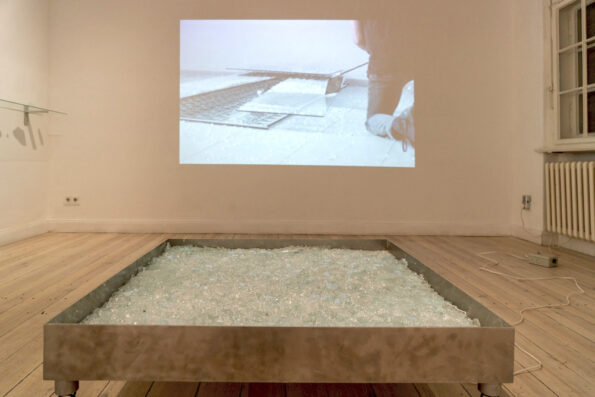
There would be many ways in which we could reinvent imagined events that linger in everyone’s memory as supposedly poetic truths. We could imagine that when Moses parted the waters in two to lead the chosen people to certain promised lands, he had consulted beforehand whether that part of the Red Sea could in fact be parted with the stroke of a rod. If the chosen path did indeed lead to those dreamed-of meadows where the animals grazed and the trees gave away their fruit like a constantly battered slot machine. What’s more, we can laugh and invent a Moses in direct line with Google, guiding that group of slaves, praying to always have mobile signal.
And the word “Earth” cannot but always be suggestive. Not only as a biblical resource. Endless religions have taken hold of it. The earth is apparently one, but as in the divine metamorphoses, it splits and dismembers to be understood, divides into thousands of them, reincarnates and adapts in an infinite wheel of time. And the exhibition we are talking about today transports us like Moses to the chosen ones, to a supposed land where the materials that sustain each and every one of our most perverse ideologies grow. Rare Earths is the name chosen and you will be able to visit it in Berlin (if the Earth doesn’t swallow you up) until the 2nd of September at GlogauAIR.
And without getting too heavy-handed, we’ll give you a bit of context. Rare earths was the name given to a series of elements (17 in particular and a rather divine figure in fact for numerologists halfway around the world) that began to be discovered in the earth’s crust at the end of the 18th century. And isn’t chemistry a divine manifestation? These substances have been applied to the most advanced technologies since the 60’s of the 20th century. We are talking about Lanthanum, Cerium and Promethium, for example, which, given their names, could well be gods of the Greek Olympus. But without being deities, they do move the winds and tides of world geopolitics. Control over them has generated wars and international conflicts because they sustain many of the most profitable industries that gravitate on our beloved Earth. And here we are gradually approaching a god that we all know, an indisputable god, a faithful ally of each and every religion. Yes, obviously we are talking about money.
Having said that, Rare Earths reflects on all the above from a global point of view, with sustainability always on the table, as the great forgotten piece in the strategic chess of the complex relations of the world and its nations. Or as the press release itself says: “Rare earth elements are essential components of many of the technologies that shape our lives today, from smartphones and electric cars to wind turbines and solar panels. They are, however, difficult to extract and process, and their production is often associated with environmental degradation and social injustice.”For that reason GlogauAIR have brought together the artists: Andreas Greiner (Germany), Fadi Al-Hamwi (Syria) and the Spaniards Arturo Comas and Rosell Meseguer, to reflect through their pieces on this complex three-way relationship between Resources-Politics-Power.
And following the exhibition’s manifesto, and with even more mythological allegories, the exhibition looks Europe in the face. According to the legend, Europe was abducted by a god in the form of a bull, we could also say that these lands’ wisdom comes with age. Europe is mired in old debts, complex issues, industries historically linked to different forms of colonialism, over-exploitation of resources, an overly positivist idea of development. To quote again from their press release: “Against this complex backdrop, the exhibition Rare Earths takes place at GlogauAIR, bringing together four contemporary artists who explore the cultural, political, and environmental significance of rare earth elements in a European context. Through a diverse range of media, including sculpture, installation, video, and performance, these artists shed light on the complex relationship between humans, technology, and the natural world, and challenge us to rethink our assumptions about the inevitability of progress.”
And the fact is that another of our great prophets has already said it (or rather, sung it)… For Garland there were other worlds at the end of the rainbow, lands she once heard about.
And maybe this exhibition will lead us to better understand that there are indeed, rare, promised lands, and let’s hope that in the future we will be able to add their particular “com” (but without a dot and at the beginning), to make them truly com-mitted.
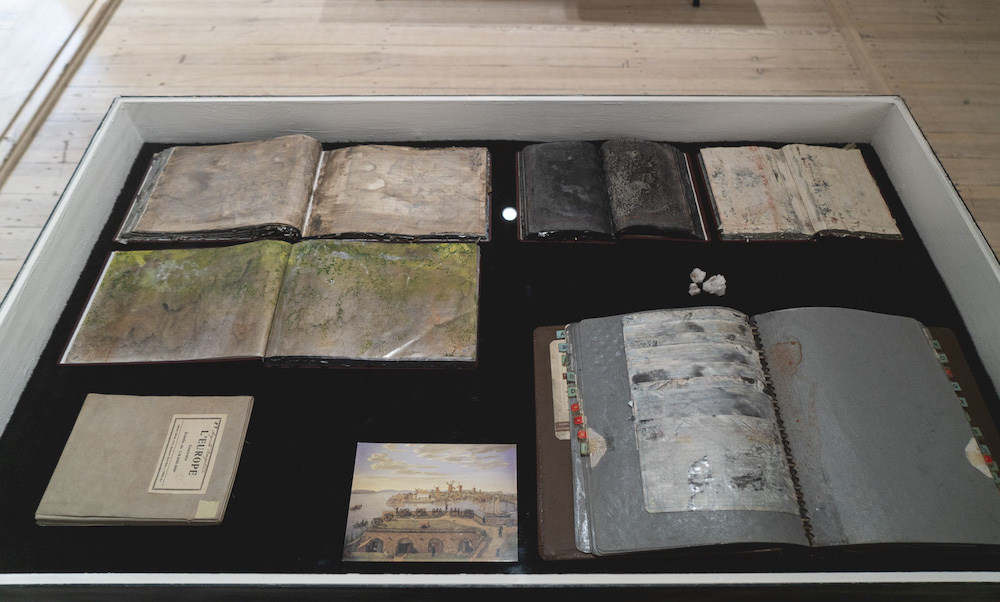
Rosell Meseguer, Lithium & Petroleum, 2017-2019, ledger books painted with photo emulsion and pigment, postcard, map of Europe
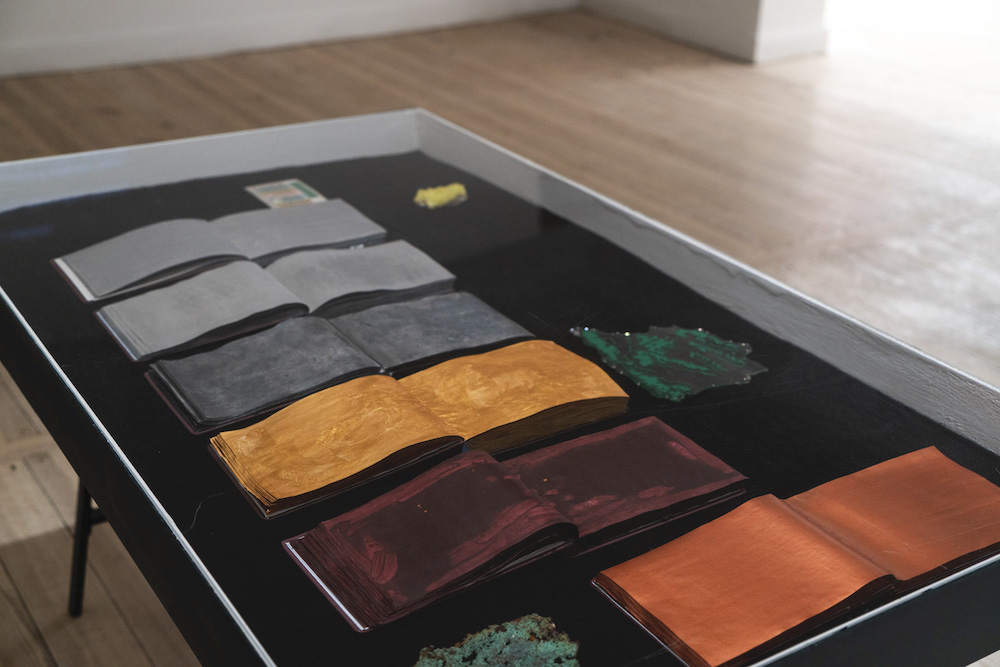
Rosell Meseguer, Rare Earths, 2017-2019, copper ore and ledger books painted with photo emulsion and pigment
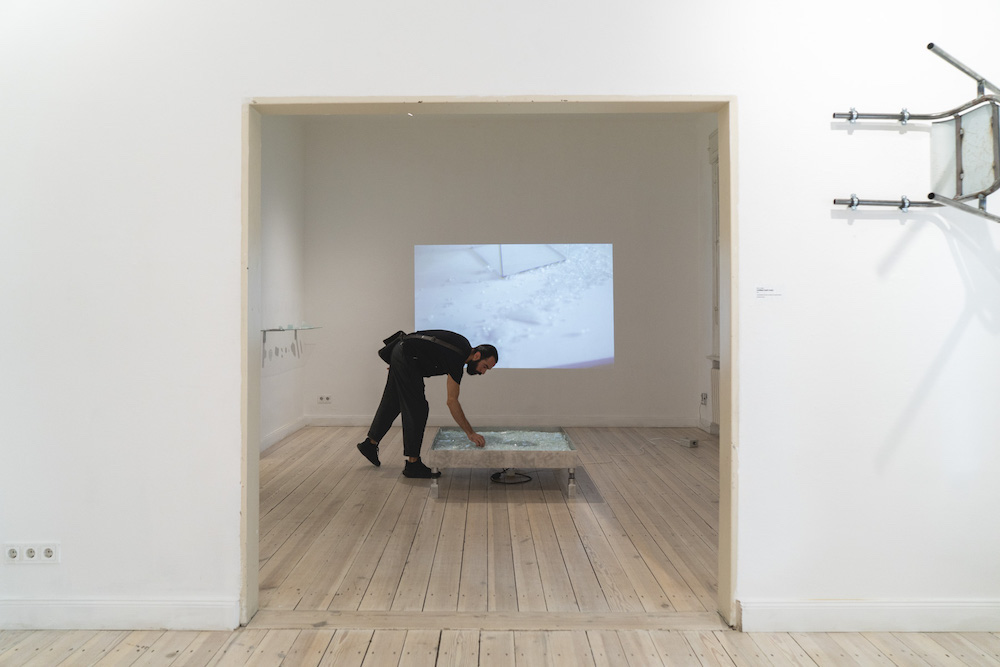
Exhibition view, back: Fadi Al-Hamwi, installation view Human Mistake , right: Arturo Comas, Untitled (wall chair)
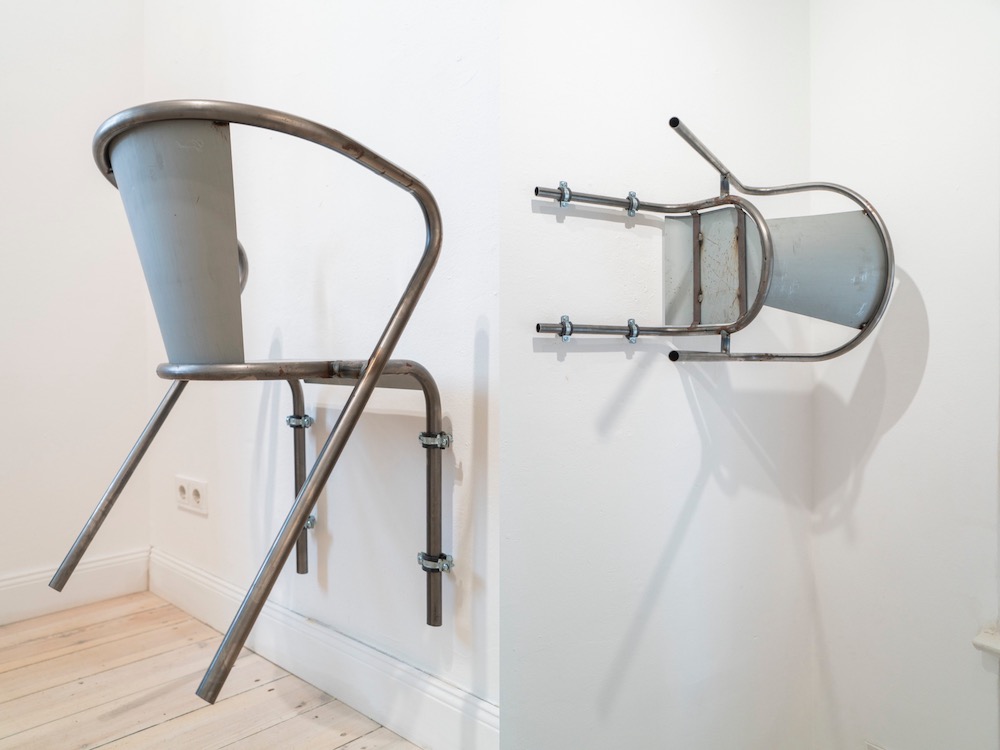
Arturo Comas, Untitled (wall chair), Three unfinished iron chairs and clamps, site-specific installation
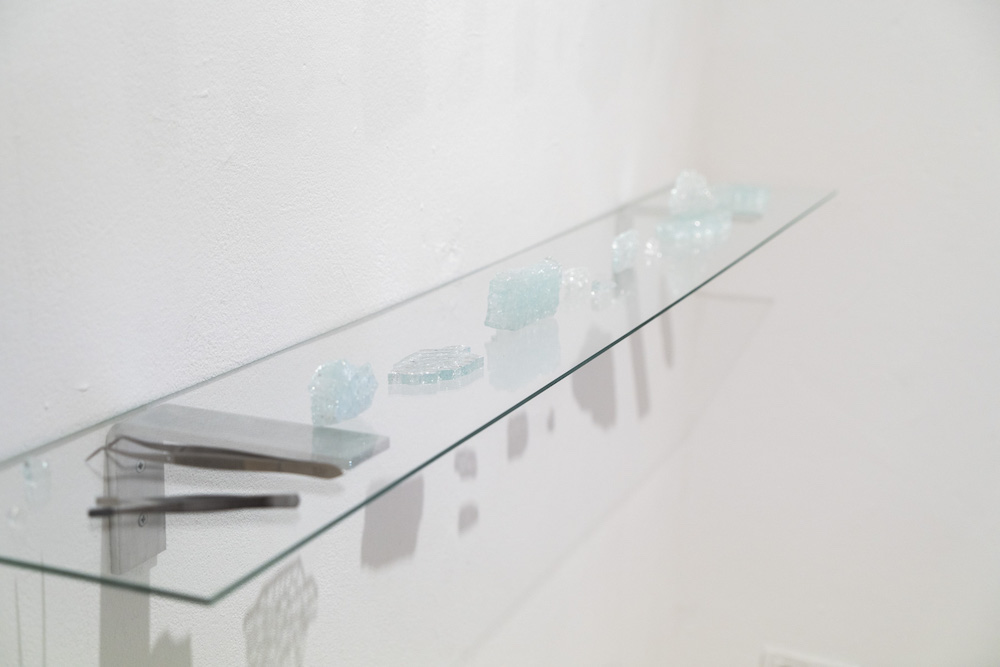
Fadi Al-Hamwi, Human Mistake, glass shelf, metal tweezer, glass shards
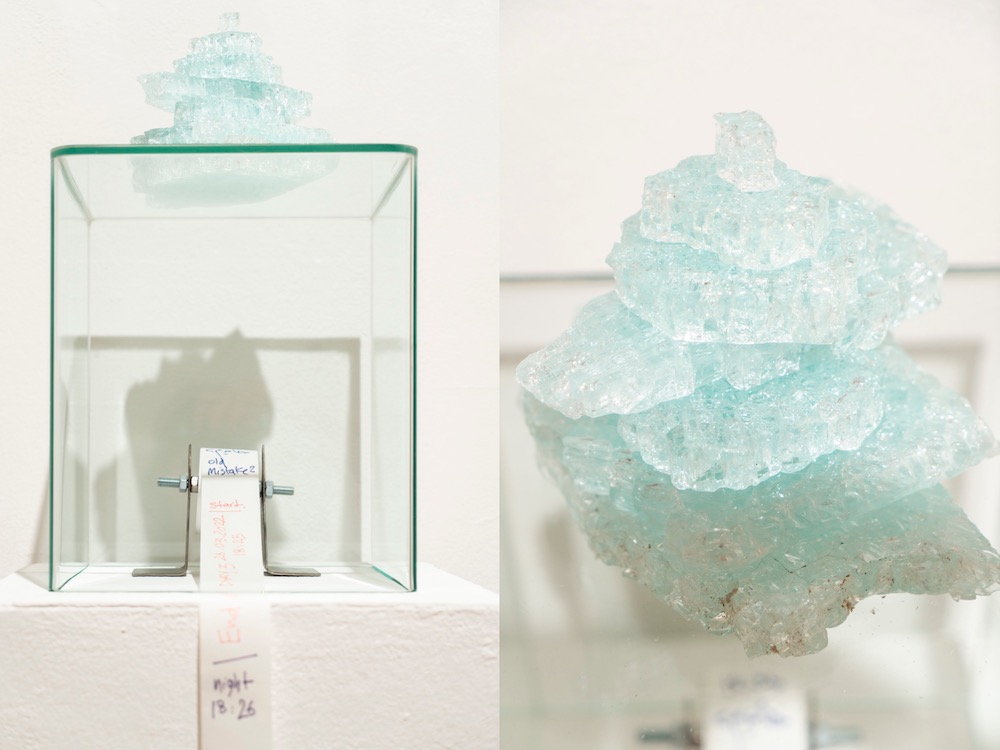
Fadi Al-Hamwi, Human Mistake, Rare Earths (details)
About GlogauAIR
GlogauAIR, is a non-profit art space in Berlin, founded in 2006 by Spanish artist Chema Alvargonzalez with the aim of creating a meeting point between artists to develop their creative projects. It currently offer residency programmes, online mentoring and exhibitions, providing technical and curatorial support and international connections. The institution fosters diversity, collaboration and cultural exchange between artists. Following Alvargonzalez’s passing in 2009, Memoria Artística Chema Alvargonzalez continues to support GlogauAIR in preserving his legacy and nurturing the artistic endeavors of the artists in residence.
Photos Tierras Raras, GlogauAIR, Berlin, Germany, 2023: Beatrice Lezzi © GlogauAIR gGmbH 2023 All rights reserved.
(Cover photo: View of the installation “Human Mistake” by Fadi Al-Hamwi)

Jesús Nebreda Galíndez is a specialist in design and art for digital platforms with a Master’s degree in Cultural Management from the City University of London whose thesis was on Fashion as one of our latest societal cultural products. Jesús has worked for institutions such as the British Museum and Saatchi Gallery and on art and design retail platforms such as Pamono and more recently Artsy. He is a regular contributor writing reviews and interviews for the publications METAL, Acero and Neo2.
"A desk is a dangerous place from which to watch the world" (John Le Carré)